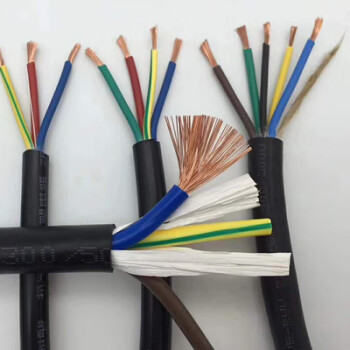YJV cable is a cross-linked polyethylene insulated power cable, referred to as (XPE) is a plastic cable, the texture is relatively hard, the temperature resistance is 90°C, and the voltage level is also higher from 1KV to 220KV. Suitable for fixed laying. There are high-voltage cross-linked cables and low-voltage cross-linked cables.
YC cable is a heavy-duty rubber-sheathed cable for mining, referred to as rubber-sheathed rubber cable. It is soft in texture, with a temperature resistance of 70°C and a voltage of 450/750V. It is suitable for mobile laying.
Voltage level: YJV cable: 0.6/1KV YC cable: 450/750V
Structural difference:
The structure of the yjv cable: it is mainly composed of conductors, polyethylene insulators, fillers (nylon, pvc composite materials, etc.), and PVC outer sheaths. Among them, the conductors are mostly copper cores, and the fillers are mostly nylon and other materials. The role of protecting the core; if it is an armored power cable, a layer of steel tape armor will be added between the filler and the sheath. The purpose is that the cable is buried underground to resist compression. The steel tape armored yjv cable The model is yjv22; the polyvinyl chloride sheath is a common pvc material.

The structure of yc cable: the full name of YC cable is heavy-duty general-purpose rubber sheath cable, Y stands for rubber insulation, and C stands for heavy-duty cable. The inner sheath is also rubber insulated, and the conductor is copper wire.
Summary of the difference between YJV cable and YC cable:
1.The materials used are different: the insulation and sheath materials of YC rubber cables are rubber, the insulation adopts IE4 type rubber, and the sheath adopts SE3 type rubber; while YJV uses cross-linked polyethylene (XLPE) for insulation, and the sheath adopts polyethylene Vinyl chloride (PVC).
2.The voltage level is different: the rated voltage of YC type cable is 450/750V and below, while the rated voltage of YJV type cable is 0.6/1KV and below.
3.Different use occasions: YC cables are used in various electrical equipment such as mobile power cords for household appliances, electric machinery, electrical equipment and appliances. YJC is used as fixed laying power transmission and distribution energy.
4.The maximum long-term service temperature of the conductor is different: the maximum allowable operating temperature of the YC cable conductor is 65°C, while the maximum allowable temperature of the WDZN-YJV cable conductor is 90°C.